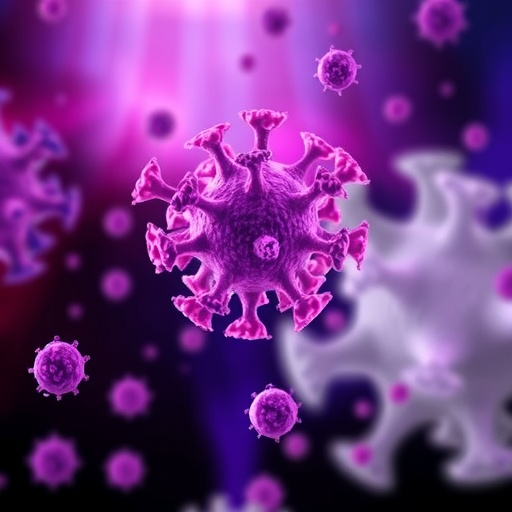In a groundbreaking study published in Biochemical Genetics, researchers have unlocked the potential for enhanced treatment strategies for patients suffering from Acute Myeloid Leukemia (AML) characterized by high-risk karyotypes. The study, spearheaded by Liu, Lu, and Sun, delves into the efficacy of the DNA methyltransferase inhibitor Decitabine when utilized in conjunction with a modified Chemotherapy regimen. This combination therapy aims to address the profound challenges that high-risk karyotype patients face, which traditionally are linked to poorer outcomes and limited treatment options.
Acute Myeloid Leukemia, known for its aggressive nature and complex genetic underpinnings, presents a significant challenge in oncology. The presence of high-risk cytogenetic abnormalities often correlates with resistance to conventional therapies, leading to a dismal prognosis. This research highlights the urgent need for innovative therapeutic interventions, particularly for those individuals who have exhausted standard treatment options without favorable outcomes.
The proposed regimen integrates Decitabine, known for its role in enhancing the efficacy of subsequent chemotherapy treatments by demethylating aberrant genes associated with malignancy. Modified CAG, which typically comprises cytarabine and other agents, is utilized to maximize the synergistic effects when combined with Decitabine. The dual-pronged approach not only aims to target the leukemic cells more effectively but also seeks to mitigate the adverse effects typically experienced during high-intensity chemotherapy treatments.
Key to this study is the identification of patients with specific genetic vulnerabilities. The researchers meticulously categorized AML patients based on cytogenetic analyses, ensuring that those with high-risk karyotypes were systematically enrolled in the clinical trials associated with this research. This targeted approach serves to provide a more personalized treatment plan that can lead to improved response rates and overall survival.
Outcomes from the combination therapy have been promising, with preliminary data suggesting improved remission rates among high-risk karyotype patients treated with Decitabine alongside modified CAG compared to historical controls. This shift in therapy not only allows for a potentially better response but also signifies a meaningful advancement in our understanding of how to utilize existing drugs in novel ways to tackle hematological malignancies.
The implications of such findings extend beyond immediate survival rates. Enhanced treatment efficacy could lead to longer disease-free intervals, a significant factor when considering patient quality of life and the long-term sequelae of aggressive chemotherapy regimens. Improved outcomes for this high-risk patient population could also spark interest from policymakers regarding funding and support for more research into targeted therapies.
Importantly, the study emphasizes the importance of genetic profiling in the treatment of AML. As advances in genomic sequencing technology become more mainstream, integrating genetic information into therapeutic decision-making is expected to be a pivotal component of personalized medicine. This approach fosters a paradigm shift in how oncologists assess and treat AML, empowering them to develop tailored strategies that consider individual genetic landscapes.
Moreover, the research highlights the necessity for continuous monitoring and adaptation of therapeutic regimens post-therapy. With AML known for its relapsing nature, understanding the molecular mechanisms that govern treatment resistance will be essential in refining future treatment protocols and improving patient outcomes. This may also lead to further investigative studies into additional combination therapies that could be integrated based on evolving patient needs.
The collaboration between researchers, clinicians, and geneticists is essential in advancing the field of AML treatment. The promising results from the current study can serve as a foundation upon which future research endeavors may build. As an increasing number of clinical trials explore the viability of various agents in combination with existing therapies, the focus on high-risk populations remains critical in the quest for more effective AML treatments.
Furthermore, therapeutic innovation in hematologic malignancies like AML signifies a broader trend within oncology. The quest for more effective, less toxic treatment modalities is of paramount importance, particularly as the healthcare landscape moves toward addressing broader quality of life issues for patients beyond mere survival. The necessity for less invasive and personalized treatments has never been clearer, highlighting the importance of research endeavors such as those conducted by Liu and colleagues.
In conclusion, the findings presented by Liu, Lu, and Sun provide a beacon of hope for patients with high-risk karyotypes in the context of Acute Myeloid Leukemia. The integration of targeted therapies such as Decitabine with modified CAG marks a significant advancement in treating a population historically laden with poor prognosis and limited options. As research marches forward, the oncology field eagerly anticipates further improvements that will translate into better outcomes for all patients diagnosed with this formidable disease.
This study not only sets the stage for further scientific inquiry but also emphasizes the importance of continued collaboration across disciplines in the fight against cancer. By harnessing the power of innovative combinations and genetic insights, the future of AML treatment may finally offer a roadmap towards more effective, individualized care that reflects the complexities of patient biology.
Subject of Research: Acute Myeloid Leukemia Treatment Strategies
Article Title: Acute Myeloid Leukemia Patients with High-Risk Karyotypes Benefit from Decitabine in Combination with Modified CAG.
Article References: Liu, P., Lu, C., Sun, Q. et al. Acute Myeloid Leukemia Patients with High-Risk Karyotypes Benefit from Decitabine in Combination with Modified CAG. Biochem Genet (2025). https://doi.org/10.1007/s10528-025-11284-z
Image Credits: AI Generated
DOI: https://doi.org/10.1007/s10528-025-11284-z
Keywords: Acute Myeloid Leukemia, High-Risk Karyotypes, Decitabine, Modified CAG, Personalized Medicine, Treatment Efficacy.




